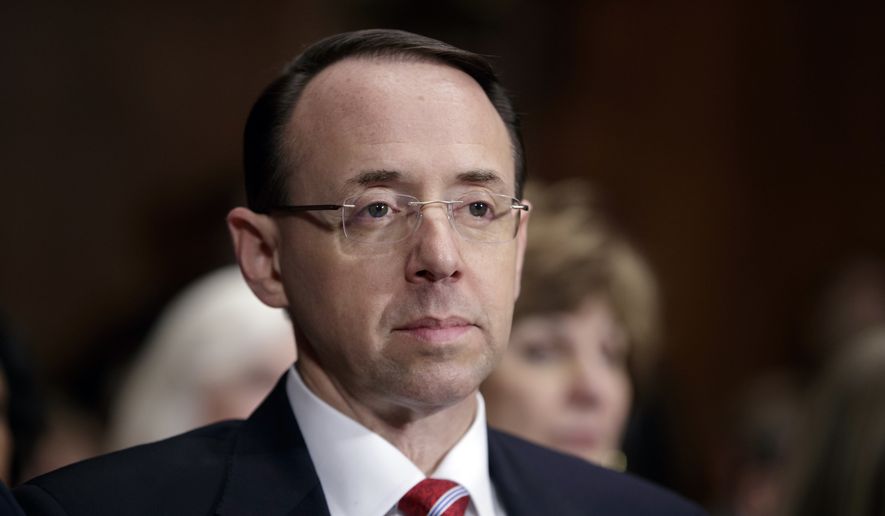Deputy Attorney General Rod Rosenstein is preparing to brief the Senate behind closed doors on Thursday to try and explain the giant political mess that is the Department of Justice’s investigation into alleged meddling by Russia in last year’s presidential election.
Mr. Rosenstein’s selection late Wednesday of former FBI Director Robert Mueller as special counsel on the Russia probe won widespread praise on Capitol Hill, after the investigation threatened to spiral out of control after President Trump fired FBI Director James Comey last week.
Mr. Comey had previously headed the probe, which began last July, into alleged Russian meddling and possible collusion between Mr. Trump’s campaign and the Kremlin.
The fight has been seen as an unprecedented battle between the outsider, Mr. Trump, and the Washington establishment. Mr. Mueller’s appointment was seen as way to meet Democrats’ demands to elevate the investigation above Mr. Trump’s political chain of command.
The 72-year-old Mr. Mueller enjoys widespread bipartisan respect for his 12-year tenure heading the FBI during the administrations of Presidents George W. Bush and Barack Obama.
The White House has repeatedly said no evidence has been found so far to support the accusations, the president resorted to Twitter again on Thursday to denounce what called the situation “the single greatest witch hunt of a politician in American history.”
In his tweets, Mr. Trump also asked why his election opponent, Hillary Clinton, Mr. Obama were not under investigation for their “illegal acts.”
Thursday’s Senate hearing — which comes amid fresh accusations that Mr. Trump had sent Mr. Comey a memo asking him to back off his investigation into former National Security Adviser Michael Flynn — was originally scheduled to allow lawmakers to ask for the DOJ’s perspective on Mr. Comey’s firing.
Senators are expected to focus on that issue, particularly Mr. Rosenstein’s role. Highly regarded since his appointment by President George W. Bush as Maryland’s top federal prosecutor, Mr. Rosenstein rose in the Justice Department during the Obama era before Mr. Trump picked him as deputy attorney general.
But many in Washington’s legal community questioned his ethics last week when he authored a critical memo about Mr. Comey’s conduct that the White House originally cited as a key justification for the FBI director’s dismissal. Mr. Mueller’s appointment has begun to restore Mr. Rosenstein’s credibility, legal analysts say.
Senators could also seek answers on questions Mr. Mueller is likely to pursue. The inquiry could go anywhere now, some say, and dig deeply into whether the Obama administration oversaw illegal and targeted leaks of sensitive intelligence.
Also on Thursday, Reuters reported that Mr. Flynn and other Trump campaign advisors made at least 18 calls and emails to Russian official with Kremlin ties during the last seven months of the 2016 presidential race.
The House will have a chance to hear from Mr. Mr. Rosenstein on Friday, as House Speaker Paul Ryan has invited him to brief all the members there.
• Dan Boylan can be reached at dboylan@washingtontimes.com.




Please read our comment policy before commenting.